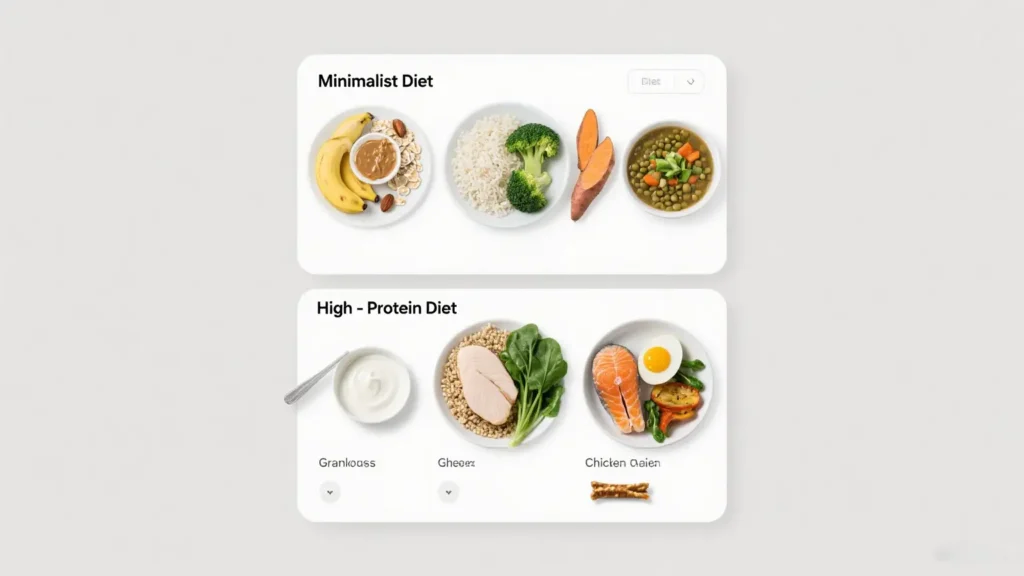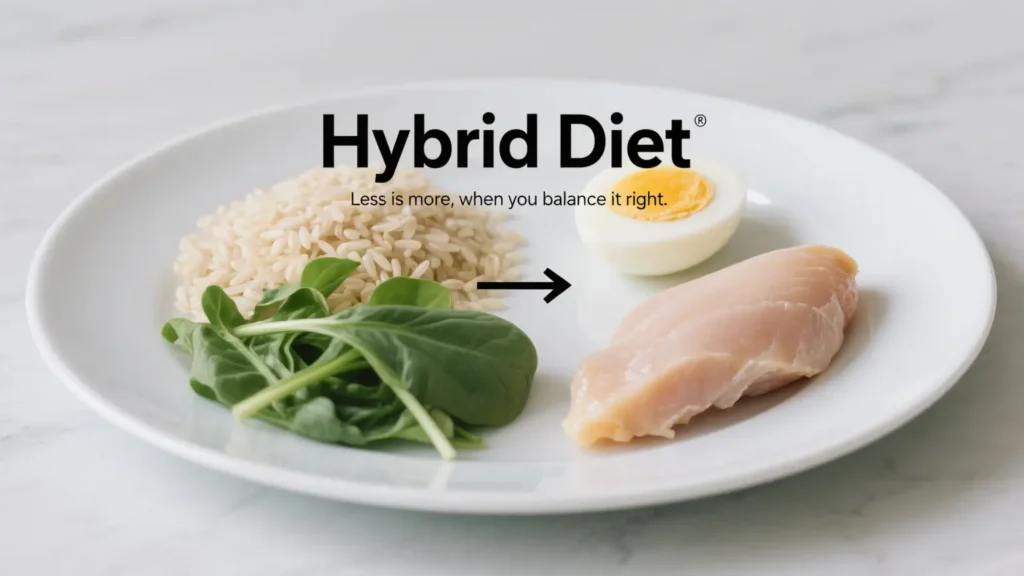Today’s wellness-conscious society is looking for different food plans that go well with their aims, principles, and hectic schedules. The subject of many discussions are the minimalist diets and high-protein diets. Although both are about improving health and simplifying cuisine, they serve different purposes.
So, which one is better? The answer is not the same for everyone. We will compare and contrast the two, discuss the benefits, the challenges, and how you can choose (or even combine) the best approach for your lifestyle.

1. Understanding the Core Principles
What is a Minimalist Diet?
A minimalist diet is the art of staying simple. It follows principles of raw whole foods, a reduction in processed foods, as well as less variety in the diet. The aim is to reduce the mental burden and the number of decisions to be made and to lead a healthy lifestyle.
Main points:
- Small number of ingredients per dish
- Mainly fruit, veg, beans, and whole grains
- No or little amount of sugar, polyunsaturated fats, and artificial additives
- Quite often, such diet is based on the plant kingdom and is presented in the form of flexitarian
The idea of minimalist diet does not imply lack, it is, rather, a matter of forsaking anything superfluous and purifying one’s diet from all that is harmful and toxic to the organism.
What is a High-Protein Diet?
In a high-protein diet, the central theme is protein as a part of the diet leading to muscle preservation, satisfaction, and health which is the basis of good metabolism. The high-protein diet is a widely followed one among athletes, bodybuilders besides in a group of people who are focused on weight loss and muscle mass gain.
Key features:
- Protein goes significantly into the share of the day’s calories (20% to 35%)
- Includes lean meats, dairy, eggs, legumes, protein shakes, and bars
- Consists of macro tracking in most cases
- Most often are low in carbs or fats, based on the specific plan (e.g., ketogenic, Paleo)
Minimalist”’ ‘s The gist here is to get rid of food clutter, while the high-protein diet is about getting the right micros.
2. Benefits and Drawbacks Compared
Nutritional Benefits
Minimalist Diet:
- Less bloated feeling as food is all-natural and whole
- Contains no or less artificial ingredients and chemicals
- Of great help in getting back weird feeding habits and forming a good relationship with food
- The food is low in calories and keeps us away from eating bad (J), ok (H) chuckled out I don’t know
High-Protein Diet:
- Helps retain muscles during weight loss or cutting
- Creates the feeling of fullness and prevents hunger and overeating
- Is the cornerstone of both muscle fitness workout and athletic performance
- Can become a powerful tool for weight loss when accompanied by the right type of physical activity

Convenience and Lifestyle Fit
Minimalist Diet:
- Less amount of ingredients to purchase, to cook, and to handle
- A good choice for fast-paced individuals who mean simplicity
- Simple in the way of preparing in big quantities or for consecutive days
High-Protein Diet:
- Will make you take specific time and energy for monitoring your protein consumption
- May demand frequent cooking or supplementation (e.g., shakes)
- Might turn to be a potentially costly diet due to the high price of protein
Long-Term Sustainability
Minimalist Diet:
- Promotes eating with no need for outside guidance.
- Is not based on fashion, powders, and the like. Suffices by itself.
- Is environmentally friendly and ethical
High-Protein Diet:
- The efficiency of the diet is noticeable for the achievement of goals in the short and medium term
- A change to other food can create a problem of continuity for you
- If you will eat foods from only one group of vegetables and do not get fats, the vitamins and minerals will become imbalanced and receive double amounts of the same, making
3. Which Diet Suits Your Goals and Lifestyle?
Ideal for Different Personality Types
Minimalist Diet may suit
High-Protein Diet may suit you if:
- You’re aiming to build muscle or reduce body fat
- You like structure and fitness driven eating
- You’re motivated by gym performance and metrics
- You enjoy meat or dairy-based meals
Cultural and Habitual Considerations
Different regions have naturally minimalist or protein-heavy cuisines. For example:
- Mediterranean and Japanese diets lean toward minimalist principles
- Western bodybuilding culture often embraces high-protein routines
Your cultural background, food availability, and cooking habits will influence which diet feels more natural to maintain.
Can You Combine Both?
Absolutely. Many successful diets are hybrids. For example:
- A minimalist high-protein diet could focus on 5–7 simple ingredients per day but ensure protein remains above 25% of caloric intake.
- You can pair lean protein sources like grilled chicken or tofu with simple greens and whole grains.
This blend offers clarity, functionality, and nutritional balance.
4. Sample Meal Plans: A Quick Comparison
Minimalist Diet Day
Breakfast: Overnight oats with banana and almond butter
Lunch: Brown rice, steamed broccoli, roasted sweet potato
Dinner: Lentil soup with carrots and spinach
High-Protein Diet Day
Breakfast: Greek yogurt with protein granola and blueberries
Lunch: Grilled chicken breast, quinoa, mixed greens
Dinner: Salmon, roasted vegetables, boiled eggs
Snacks: Protein bar or shake, boiled eggs, cottage cheese

5. Cost and Accessibility
Minimalist Diet:
- Lower cost overall due to plant-based ingredients
- Fewer packaged goods
- May save time and reduce food waste
High-Protein Diet:
- Costlier due to lean meats, seafood, and supplements
- Requires a variety of perishable items
- Shopping may take longer due to macro focus
However, both can be optimized for cost-efficiency with proper planning.
6. Common Misconceptions
Myth: Minimalist Diets Are Nutritionally Deficient
Although minimal, a minimal diet is nutritionally complete, and it can be the hard one for some. A minimal diet has all the basic nutrients one needs but in minimal amounts, and with time the nutrients can reduce as the same being done on the food. Please, if you found the mentioned myt
Myth: High-Protein Diets Are Harmful to Kidneys
The problem of the kidney is the primary health issue of most people who have this notion of their own. High-protein diets are hence a threat to these individuals and are their biggest dietary no-no. As seen in healthy individuals, high protein consumption has been accredited as largely non-hazardous as not causing any d
Myth: You Must Choose One Forever
The theory that diets must have only one choice throughout has been proven incorrect. Life is a journey and so should you treat your diets. Like your objectives, emotions, or way of life, you can change from one diet to another. The ability to change is the ke
7. Tips for Transitioning Between Diets
From Minimalist to High-Protein:
- Gradually increase lean protein portions
- Consider low-prep protein sources like boiled eggs or protein powders.
From High-Protein to Minimalist:
- Focus on seasonal vegetables and whole grains.
- Cut down on processed supplements and return to food basics.
8. Real-Life Testimonials
Sophia, 29 (Minimalist Diet): “I am the kind of person who would spend lots of time going through the list of suitable foods for my diet. The only choice I have now is to make a combination of 10 simple ingredients, and I feel more relaxed and powerful. “
Jake, 35 (High-Protein Diet): “As a coach, I am aware of the importance of protein. By measuring the quantities of different foods I eat, I managed to reach my goals in terms of performance while at the same time I have been managing to be on the leanness side. “
Mira, 41 (Hybrid): “My meals are the mixture of both—high in protein but also minimalist. It leaves me satisfied, focused, and not overwhelmed by the choices I have. “
9. Final Thoughts: Which is Right for You?
Both the minimalist and high-protein diets are definitely of benefit. It all comes down to what you get from your day-to-day life:
- Looking for simplicity, sustainability, and to be in touch with the food? The minimalist diet could be the one that suits you the most.
- Have some exercise targets to achieve, muscle growth, and need good organization? Maybe a high-protein diet is more likely to work better for you.
Another idea is to take both of the approaches into consideration in order to get the clarity of minimalism and the benefits of protein. No matter which path you decide to take, the best diet is one that works for you, provides you with all the health benefits, and at the same time, maintains its role as an integral part of your everyday life.
Are you all set to start testing minimalist diets compared to high-protein diets?, You can begin with slight changes to what you eat, keep a close eye on the way your body reacts and adjust the meals you eat as time goes by to meet your needs. The ultimate decision is in your hands; the best diet choice might be a mix of the two strategies.